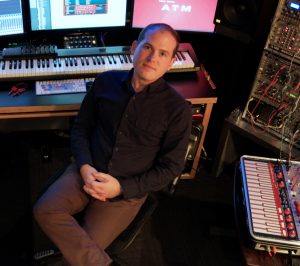
UCF alumnus Alexander Bornstein ’09 is an award-winning composer currently based in Los Angeles. His music has been heard on television, independent films, feature films, web series, documentaries and concert halls around the U.S. Alexander has also been at the forefront of new multimedia platforms, composing music for one of the first VR television series.
How did you know that you wanted to pursue music?
Deep down, I think I’ve known since I was a kid pretending to air conduct “The Empire Strikes Back” in the basement, or receiving bewildered looks at a Sam Goody record store—yes, that long ago—after asking if they had the soundtrack to “Robocop.” For the record: it exists, and I have several copies.
I’ve always been an avid movie lover and ended up pursuing filmmaking as a kid through my first years at college, thinking that I “missed the train” on becoming a musician. I have heard so many stories of people giving up on music after they realized they weren’t going to be the next Miles Davis or Joni Mitchell.
After experimenting with composing on my own with just a couple years of piano lessons under my belt, I began to realize that my true love really was music. I reached out to open-minded professors who encouraged me, but were also blunt about the ground I had to cover. After taking classes with faculty like Stella Sung and Per Danielsson, my academic life instantly shifted when I was able declare my major in music. From that moment, music became my only pursuit.
What have you been up to since graduating from UCF?
After UCF, I received my Master of Music in Music Theory/Composition with an emphasis in scoring for films at NYU. From there, I made the move to Los Angeles. During grad school I interned for the composer Bear McCreary (“The Walking Dead,” “Battlestar Galactica,” “The Cloverfield Paradox”) and it helped me realize quickly that this is the city where the most opportunities existed for someone fresh out of school like me.
I was very fortunate to end up at Hans Zimmer’s Remote Control Productions, one of the epicenters for film scoring. While I started out making coffee, I eventually “graduated” and got to do things like help create custom sampled instruments for “The Dark Knight Rises” and even go to the Academy Awards as a Music Department Assistant (Zimmer was the music director that year.)
Then I began working for composer Christopher Lennertz and assisted him for a few years. I got to contribute music to shows like “Revolution,” “Galavant,” “Marvel’s Agent Carter” and the film “Ride Along 2.” Since going freelance, I’ve also written additional music for movies and shows such as “Supernatural,” “Baywatch,” “Ray Donovan,” “Philip K. Dick’s Electric Dreams” and was heavily involved in the 2018 Netflix reboot of “Lost in Space,” writing almost four hours of music and creating an important sound for the robot character.
I have also entirely composed scores for many films and webseries including the very first narrative series developed for virtual reality entitled “Invisible,” produced by the director of “The Bourne Identity” and “Edge of Tomorrow.” In 2017, I released my first solo album “Schematic.” It was a mix of chamber orchestra and electronics which have become a huge passion of mine–I’m particularly fascinated by Don Buchla and his unique instruments. With any luck, I’ll release a follow up this year or early 2019.
How do you see the music industry changing with new technology?
Computers and music will continue to be more and more intertwined. Gone are the days of a composer writing with just pencil and paper—at least for film, television and video game scoring. Today, a composer must wear many hats to be viable. On a project I might have to write, produce, arrange, program and mix the music. I work extensively in software and find it’s only becoming more driven by technology. I have had to become very proficient at all kinds of things from analog synthesizers to knowing how hard drives work. I think musicians will keep on needing to be more and more multi-faceted.
What was your fondest memory as a UCF student?
The first time I had a piece of music performed by the UCF Orchestra at one of their rehearsals. I barely slept the night before and remember showing up to the rehearsal terrified as I handed out the parts to the musicians. Hearing it played was so great though!
What’s the best piece of advice you’ve ever received?
Even the greatest musicians in the world have weaknesses. When I first heard this, it was earth shattering and it holds true to every aspect of the music business I’ve been exposed to.
Consequently, the more honest I am with myself about my own weaknesses, the easier it is to begin turning them into strengths. The power of this advice also allows me to be at peace with the things I might not be as skilled at as I would like and that even a legend like John Williams has things he might not be amazing at.